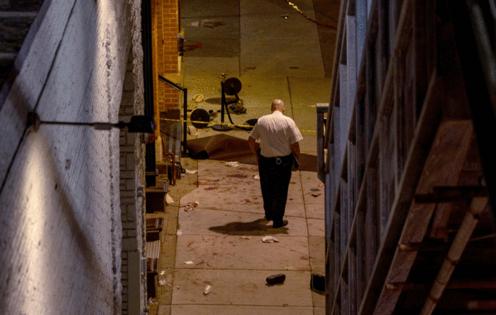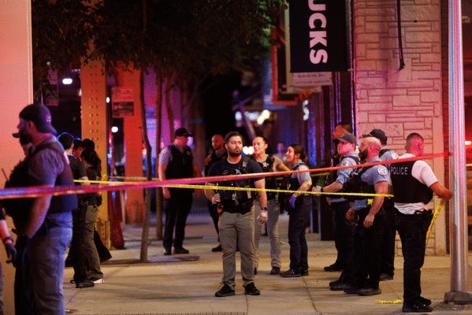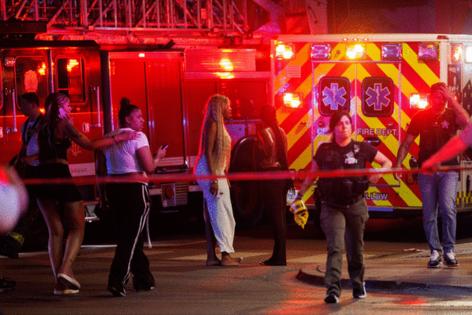Commentary: Why not hold gun manufacturers accountable for mass shootings?
Published in Op Eds
At least 18 were shot, four fatally, in Chicago's River North neighborhood after a drive-by shooting last week. Four families will prepare expenses for funeral services and seek mental health support in the wake of their loss. Or they may be so paralyzed by this event that they lose all functionality. The 14 who survived the shooting will fall anywhere along a spectrum of permanent disability to a “normal” life with bullet wounds as a reminder of their trauma.
The shooters will be held accountable. Illinois, its citizens, will pay for it. The firearm industry will profit from it.
Fifty-four percent of adults in the United States have reported that they or a family member have experienced a gun-related incident. In other words, over half the country can say they have been personally affected by a gun injury. Meanwhile, gun manufacturers, foreign and domestic, have been shielded from accountability and lawsuits for the outcomes of their products that most Americans have experienced.
The state of Illinois pays an estimated $18.6 billion a year toward firearm injury and death. Firearm manufacturers share none of these costs. The River North mass shooting will cost, conservatively — for the victims, their families and Illinois taxpayers —$2.5 million. The family will be held accountable, the storefront owner may be sued and the taxpayers will pay. The manufacturers of the guns that killed four and injured 14 others will watch as Illinois citizens and individuals across this country reflexively purchase more guns. Gun manufacturers will profit off the fear and angst that, tomorrow, we might be next.
A federal law passed in 2005 protects the firearm industry from accountability. The Responsibility in Firearm Legislation Act in Illinois will change that. This act, introduced in the 104th General Assembly, creates an injury restitution fund, financed by firearm manufacturers, foreign and domestic, according to how frequently their products are recovered in events such as the River North mass shooting. When the RIFL Act is law, in order for finished firearm manufacturer products to be sold, imported or distributed in the state of Illinois they must contribute financially according to the harm and damage created by their products in our state.
The RIFL Act reinstates accountability for firearm manufacturers, providing a powerful financial incentive to innovate safer products, to reduce the harm they cause in Illinois, and to engage in suicide and violence prevention. The technology and the ability to quell firearm injury exists among finished firearm manufacturers, but it will not happen until our state ends the profitability of tragedies like the one in River North on July 2. Now is the time for our state to lead the rest of the country and our federal government.
Firearm injury is the No. 1 cause of death for children and teens, the No. 1 cause of death for pregnant women and the No. 1 cause of suicide. What more will it take? For the surgeons in our group, those statistics are not just numbers for us: We see the faces, the bodies, the injuries and the families, every single day.
No other industry in the United States is afforded the luxury of turning a blind eye to the public costs and impact their products have on society. Not the tobacco industry, not the automotive industry, not the pharmaceutical industry, not the construction industry, not the insurance industry, not even the chemical and nuclear engineering industry. The Second A mendment does not absolve gun manufacturers of responsibility.
The RIFL Act has no bearing or impact on an individual’s right to bear arms; it requires the same standard of responsibility that all industries in this country carry. In the process, passing the RIFL Act saves the state of Illinois and taxpayers an estimated $300 million a year in costs to Medicaid and Medicare for firearm injury. In light of 17 million Americans who soon may be stripped of their health care insurance after the$1 trillion tax cut to Medicaid, this bill has never been more necessary for our state.
The surviving victims of the River North shooting will be responsible because they were shot. On average, being shot and hospitalized is an$82,000 medical bill. Additionally, the taxpayer, hospitals, and those with private or employer-based health insurance will be responsible for these costs. Gun violence is expensive, and taxpayers of Illinois won’t foot the bill any longer for it.
Our thoughts and prayers go toward all the victims and those affected by this devastating and unfortunate event.
____
Dr. Anthony Douglas II is a general surgery resident at the University of Chicago. Dr. Selwyn Rogers Jr. is the section chief of trauma and acute care surgery at University of Chicago Medicine. Dr. Mallory Williams is chair of the Department of Trauma and Burn Services at Stroger Hospital. Arne Duncan is a managing partner of Emerson Collective and founder of Chicago CRED.
___
©2025 Chicago Tribune. Visit at chicagotribune.com. Distributed by Tribune Content Agency, LLC.






























































Comments